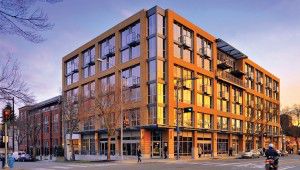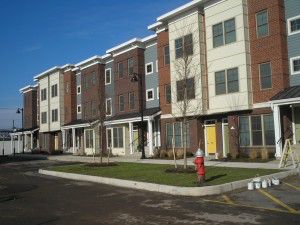Leading at the Edge: Five Local Innovative Affordable Housing Policies
By Lisa A. Sturtevant, PhD
Vice President for Research, National Housing Conference
 When you look around the country for innovative local affordable housing policies, you’ll often find your way back to local jurisdictions in the Washington DC region. From Montgomery County’s pioneering inclusionary zoning program to Arlington County’s efforts to preserve affordable housing through its Columbia Pike Neighborhoods Form Based Code to Fairfax County’s initiatives to link housing and services as a Moving to Work agency, there are a multitude of successful and inventive affordable housing programs right in our own back yards. However, there are a lot of exciting initiatives being introduced in communities around the country that may serve as models for new or expanded local affordable housing policies in our region. The energy around affordable housing policy is growing across the country as cities and regions increasingly recognize the role housing affordability plays in regional economic competitiveness and local fiscal health. In addition, HUD’s affirmatively furthering fair housing regulation and the Supreme County’s disparate impact ruling have created greater urgency for localities to expand affordable housing opportunities.
When you look around the country for innovative local affordable housing policies, you’ll often find your way back to local jurisdictions in the Washington DC region. From Montgomery County’s pioneering inclusionary zoning program to Arlington County’s efforts to preserve affordable housing through its Columbia Pike Neighborhoods Form Based Code to Fairfax County’s initiatives to link housing and services as a Moving to Work agency, there are a multitude of successful and inventive affordable housing programs right in our own back yards. However, there are a lot of exciting initiatives being introduced in communities around the country that may serve as models for new or expanded local affordable housing policies in our region. The energy around affordable housing policy is growing across the country as cities and regions increasingly recognize the role housing affordability plays in regional economic competitiveness and local fiscal health. In addition, HUD’s affirmatively furthering fair housing regulation and the Supreme County’s disparate impact ruling have created greater urgency for localities to expand affordable housing opportunities.
What are cities and counties across the country doing right now to meet affordable housing needs? Who is leading at the edge in terms of innovative affordable housing policy?

1. Inclusionary Housing
In San Francisco, as part of a comprehensive affordable housing strategy, Mayor Ed Lee has proposed to relax current inclusionary housing requirements to allow housing developers to meet affordability requirements by providing housing for a broader range of incomes. The proposed changes are targeted at creating more rental housing affordable to households earning up to 90 percent of area median income ($91,700 for a family of four) and more ownership housing for households earnings up to 120 percent of area median income ($122,300 for a family of four). The Mayor’s proposal also includes initiatives to preserve public housing and to reduce tenant displacement.
2. Commercial Linkage Fee
Seattle’s mayor Ed Murray has also rolled out a new proposed affordable housing strategy, and one element of his plan is the

so-called Affordable Housing Impact Mitigation Program (AHIMP)—a commercial linkage fee program—that requires developers to pay a fee of between $5 and $17 per square foot of commercial development into an affordable housing fund. In exchange for the fee, developers will be able to build at higher densities. The Boulder City Council also recently approved a fee on commercial developments which will be used to fund affordable housing production and preservation. Fees vary based on the type of development but range from between nine cents a square foot for warehouse development to $9.53 per square foot for hospitals.
3. Rezoning Single Family Neighborhoods
In Seattle, there was also a proposal—very much a draft proposal—to do away with single-family zoning in the city to allow for higher-density development. The change would allow for townhouses, duplexes and other small multi-family buildings to be built as-of-right in existing single-family neighborhoods. While ultimately this change did not make it into the mayor’s proposed affordable housing strategy, the proposal generated quite a bit of discussion about the future of zoning during the local election cycle.
4. Notification and Right of First Refusal
In an effort to stem the loss of affordable rental units in Denver (where rents have increased faster than anywhere else around the country over the past year), the City Council is poised to pass legislation that would require property owners to give residents and the city a year’s notice that they intend to opt out of affordability covenants when they expire. The city would then have the right of first refusal to match any offer to buy the property using funds from a fee- and tax-funded affordable housing fund.
5. Payment in Lieu of Taxes (PILOT)

Jersey City, New Jersey has drafted a new tax incentives policy to encourage housing development in the city’s underdeveloped neighborhoods. The new policy builds on the city’s Payment in Lieu of Taxes (PILOT) policy, which was enacted in 2013, and provides builders with property tax abatements of different lengths depending on the type of neighborhood in which they build. In addition, developers can extend those property tax abatements when they include affordable housing in their projects. Because New Jersey has some of the highest property taxes in the country, officials are hopeful that this policy will provide the necessary incentives to spur development.
These policy approaches are not necessarily appropriate for consideration in every jurisdiction in the region. However, the varied options that have been approved by local elected officials across the country, or are being proposed as part of a broad affordable housing strategy suggests that options for affordable housing solutions could be expanded. To uphold the role of “leader” in local affordable housing policy, local jurisdictions in the region should not be afraid to have conversations about innovative—potentially controversial—policy ideas. There are examples both locally and nationally about how progressive political will can help build support for impactful affordable housing policies that were once thought to be impossible.
Next month: Fair Housing in the Greater Washington DC Region






Trackbacks & Pingbacks
[…] Matters@Hand thought-leadership series sponsored by Enterprise Community Partners, HAND explores innovative affordable housing policies from around the country. (Helping Hands Blog, […]
Leave a Reply
Want to join the discussion?Feel free to contribute!